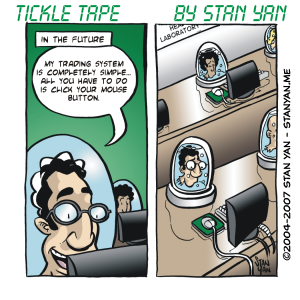A common complaint of novice traders is that they just can’t seem to stick with their trading plans. Many novice traders develop a viable trading plan only to abandon it impulsively. What goes wrong? Part of the problem is making the plan too vague. Parts of the plan are missing, and when a plan is incomplete, it is hard to follow and execute. But that’s only part of the problem. For many novice traders, an additional issue concerns the thoughts and emotions that are experienced when the plan is actually executed. The best-laid plans are developed with one is calm and clear-headed, usually long before the plan is to be executed. Entry and exit points can be clearly specified. When the plan is executed later on, however, a barrage of various emotions may be experienced, and these emotions, if left unchecked, can thwart your plans. Emotions can colour our perspective. For example, when you develop a trading plan during a quiet evening, it may seem to make logical sense. But then the market opens the next morning, and everything suddenly looks different. Your mood, and your perspective, can change for a variety of reasons. Perhaps you had a bad dream and are a little preoccupied. Perhaps you suddenly started worrying about money. Various thoughts and fears distract you. Your son’s tuition is due next month.
Emotions can colour our perspective. For example, when you develop a trading plan during a quiet evening, it may seem to make logical sense. But then the market opens the next morning, and everything suddenly looks different. Your mood, and your perspective, can change for a variety of reasons. Perhaps you had a bad dream and are a little preoccupied. Perhaps you suddenly started worrying about money. Various thoughts and fears distract you. Your son’s tuition is due next month.
Your car needs a major tune-up. Perhaps it’s hot and stuffy in your office the next day, or you are just weary or groggy for no apparent reason. Or it could be that the markets are just behaving more erratically than you had anticipated. Whatever the feelings, or the reasons for them, they influence your thoughts and perceptions. What to do next varies from trader to trader. Some traders stand aside and wait for their mood to improve. Seasoned traders, who have seen it all and aren’t easily fazed by much, may ignore their feelings and continue. But a novice trader with little experience may be easily shaken. It’s at these times when trading errors are made or trading plans abandoned entirely.
Preventative measures can be taken, however. First, develop a clearly defined trading plan. Make sure that you know exactly when you will enter, and what signals indicate that you should exit. Second, focus all your energy on executing the plan. This is easier said than done. When you are emotionally distracted, your limited psychological resources are taxed to the limit. You have a few psychological resources left to execute your trade. You can’t rethink your plan when you have limited ability to focus. The best solution to this problem is to limit your attention to executing your trading plan as you have outlined it.
Don’t second-guess it. Don’t think you can make a last-minute change. Just execute it the way you had planned it. It’s like trading as if you were a warrior. When warriors are ready to fight, they don’t question their skills. They don’t worry about whether they are unprepared. They are ready to fight an opponent and need to focus only on winning, and just do it. That’s what you should do when you execute your plan under stressful conditions. Don’t second-guess your plan. Live in the moment. There’s no reason not to. You should have factored in the risks upfront when you outlined the plan, and know deep down that you can’t experience any real harm should the plan fail. You’ve prepared as much as possible.
In many ways, your fate is already determined. You just need to execute the trade flawlessly and effortlessly and find out what was meant to happen. But if you choke under the pressure, you may mess it all up. If it’s a loser, there’s nothing you can do. If it was meant to be a winner, however, and you let your emotions fowl up your plan, then you have lost one of the trades that may have been one of the winners across a series of trades. And from a purely statistical vantage point, you want to win on every possibility that you could have. That means executing your plan rather than abandoning it. The best-laid plans can be ruined if you don’t execute them properly. But if you clearly define your plan and focus solely on executing it, you’ll trade profitably in the long run.

